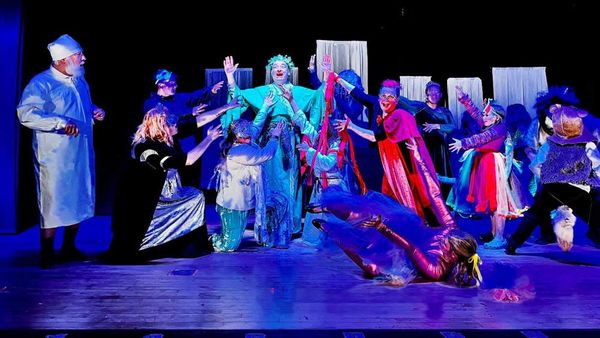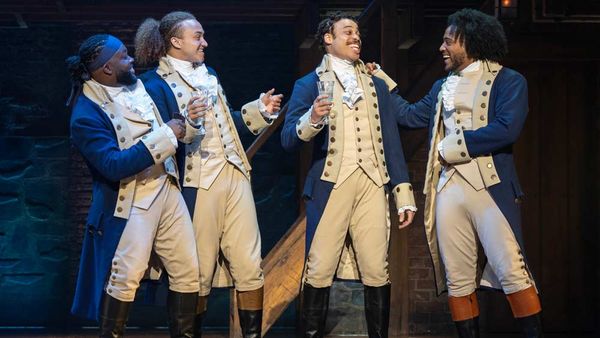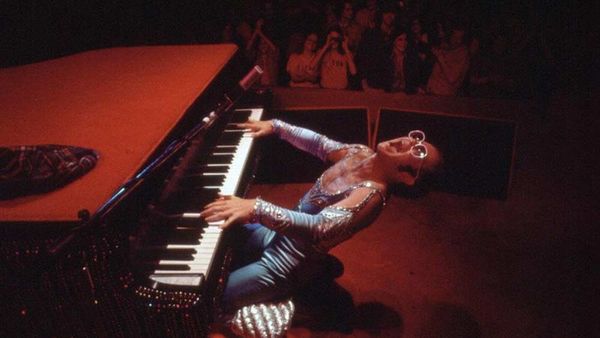April 18, 2023
Review: 'Beau is Afraid' Raises Stakes, Risks for Filmmaker Ari Aster
C.J. Prince READ TIME: 4 MIN.
Watch Ari Aster talk about "Beau is Afraid"
Woe to anyone who finds themselves inside an Ari Aster film. The filmmaker, whose two features "Hereditary" and "Midsommar" have already been hailed as new horror classics, puts his characters through the wringer as much as possible. Characters find their lives shattered from traumatic events, with no ability to piece themselves back together; they either get obliterated in the process, or come out of it as an entirely different person.
Aster's exploration of this idea through a horror framework made for some fun, dread-filled times for anyone willing to go along for the ride, and with his latest film, "Beau is Afraid," Aster breaks free from genre hooks to deliver a sprawling, admirable, and uneven odyssey built around fear, anxiety, trauma, and mommy issues. It's a massive swing of a film, and while it might not land as hard as it swings, there's enough to admire in the effort.
Joaquin Phoenix plays Beau Wasserman, a middle-aged pile of nerves whose existence is in a petrified stasis. He lives alone in a derelict apartment surrounded by violent vagrants who all seem to want him dead, and goes to a therapist (Stephen McKinley Henderson) to vent about his domineering mother Mona (Patti Lupone). Beau is about to fly out to visit his mother, a trip he wants to do, but feels ambivalent about due to the strained, codependent nature of his relationship to her. A string of bad luck leads to Beau missing his flight, disappointing his mother and forcing him on a journey to get to her, where almost everyone he meets seems hellbent on preventing him from getting to his destination.
The opening act, which takes its time establishing Beau's surreal, heightened perspective on the world, makes for some of Aster's best work to date. Anyone who's ever had to fret over something, or constantly worry about the worst-case scenario, will find something relatable in the way Beau finds himself surrounded by an environment where every worry of his is valid, and there's a lot to laugh at in the details and idiosyncrasies that pile on top of each other to convey the state of being on the constant verge of a panic attack. Two phone conversations Beau has, one with his mother and another with a UPS driver, play out as awkward, squirm-inducing interactions that are like living nightmares. Aster's ability to lean into these smaller-scale moments, while also throwing everything at the wall with the dense, meticulously choreographed chaos going on in the street outside Beau's apartment, show a level of ambition and inability to compromise that's not seen too often anymore on this scale.
Once "Beau is Afraid" sends its title character out into the world, the episodic structure of his encounters is more uneven, and with its three-hour runtime the film eventually becomes a case of diminishing returns. A chapter involving a surgeon (Nathan Lane) and his wife (Amy Ryan) who take Beau in as a guest gets by on its strong performances and willingness to get weird, while an extended flashback of a teenage Beau with his younger mother (Zoe Lister-Jones) provides more insight on how Beau developed his personality. Meanwhile, a later section set in the woods amounts to an overly long digression from the main story that hammers the same point over and over in a riff on Charlie Kaufman's past work with directors like Spike Jonze and Michel Gondry. As well-executed as a sequence like that may be (and it's a showcase for production designer Fiona Crombie, whose work might be the best part of the film), it can't escape the feeling of being an indulgent misstep due to its predictability.
The final act has its highlights, although some of the twists Aster throws out showcase an impulse for juvenile humor that comes across as shock for its own sake. This is not to say that "Beau is Afraid" fails at what it sets out to do, though, just that the experience doesn't sustain itself with the same energy and excitement of its opening act. Aster's penchant for showmanship and his ornate style means there's rarely a dull moment, and for the most part it's hard to predict what will happen from one moment to the next. Fans of "Hereditary" and "Midsommar" might find themselves running in the other direction of "Beau is Afraid" once they realize how little it cares about having an internal logic or hitting on more familiar story beats, but there's something enjoyable about seeing Aster translate his past successes into demanding more from audiences, and seemingly giving less of a damn about playing into their preferences.
It's getting harder to see risks like "Beau is Afraid" on this scale, and unlike recent fiascos like "Babylon" or "Bardo," Ari Aster has enough bravado and distinctiveness to cut him some slack, even when some of his instincts don't necessarily pay off. Sometimes there's value in the willingness to fail.
"Beau is Afraid" premieres in theaters April 21.







